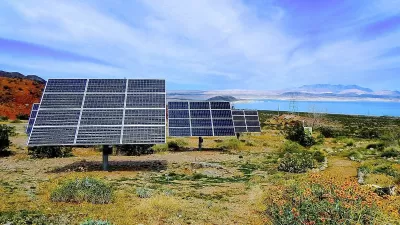In an effort to preserve coastal Texas ecosystems and fight global warming, a new nonprofit is paying landowners to not develop their land.

The Texas Coastal Exchange is an organization providing financial incentives to landowners to protect coastal lands, including coastal marshlands and prairies, reports Perla Trevizo. Payments come from carbon-footprint donations and are based on the land area, the type of ecosystem, and amount of carbon dioxide being sequestered.
"The way the system works, the donor pays $20 to support the storage of one metric ton, with $17 going to the landowner in the form of a grant and the other $3 being used to support the educational outreach and administration of the organization," writes Trevizo.
As part of the deal, property owners agree to not sell or develop their land for ten years. It is a mutually beneficial agreement—natural lands are preserved and landowners, including farmers and ranchers, have a guaranteed source of income.
"The exchange’s initial goal is to enroll 2 million acres of undeveloped coastal lands in Texas. Its hope is that this model is replicated elsewhere in the country," notes Trevizo.
FULL STORY: New Texas nonprofit offers novel approach for preserving coastal lands, combating global warming

Planetizen Federal Action Tracker
A weekly monitor of how Trump’s orders and actions are impacting planners and planning in America.

Maui's Vacation Rental Debate Turns Ugly
Verbal attacks, misinformation campaigns and fistfights plague a high-stakes debate to convert thousands of vacation rentals into long-term housing.

San Francisco Suspends Traffic Calming Amidst Record Deaths
Citing “a challenging fiscal landscape,” the city will cease the program on the heels of 42 traffic deaths, including 24 pedestrians.

Amtrak Rolls Out New Orleans to Alabama “Mardi Gras” Train
The new service will operate morning and evening departures between Mobile and New Orleans.

The Subversive Car-Free Guide to Trump's Great American Road Trip
Car-free ways to access Chicagoland’s best tourist attractions.

San Antonio and Austin are Fusing Into one Massive Megaregion
The region spanning the two central Texas cities is growing fast, posing challenges for local infrastructure and water supplies.
Urban Design for Planners 1: Software Tools
This six-course series explores essential urban design concepts using open source software and equips planners with the tools they need to participate fully in the urban design process.
Planning for Universal Design
Learn the tools for implementing Universal Design in planning regulations.
Heyer Gruel & Associates PA
JM Goldson LLC
Custer County Colorado
City of Camden Redevelopment Agency
City of Astoria
Transportation Research & Education Center (TREC) at Portland State University
Jefferson Parish Government
Camden Redevelopment Agency
City of Claremont





























